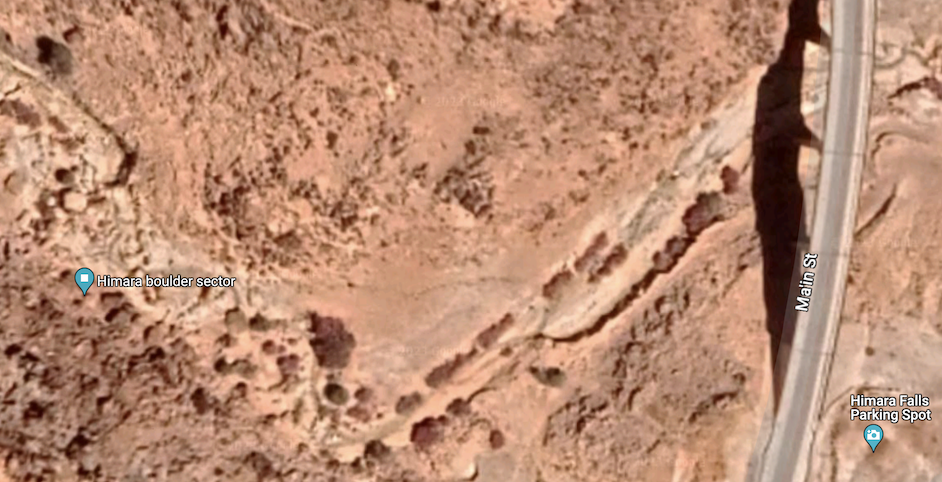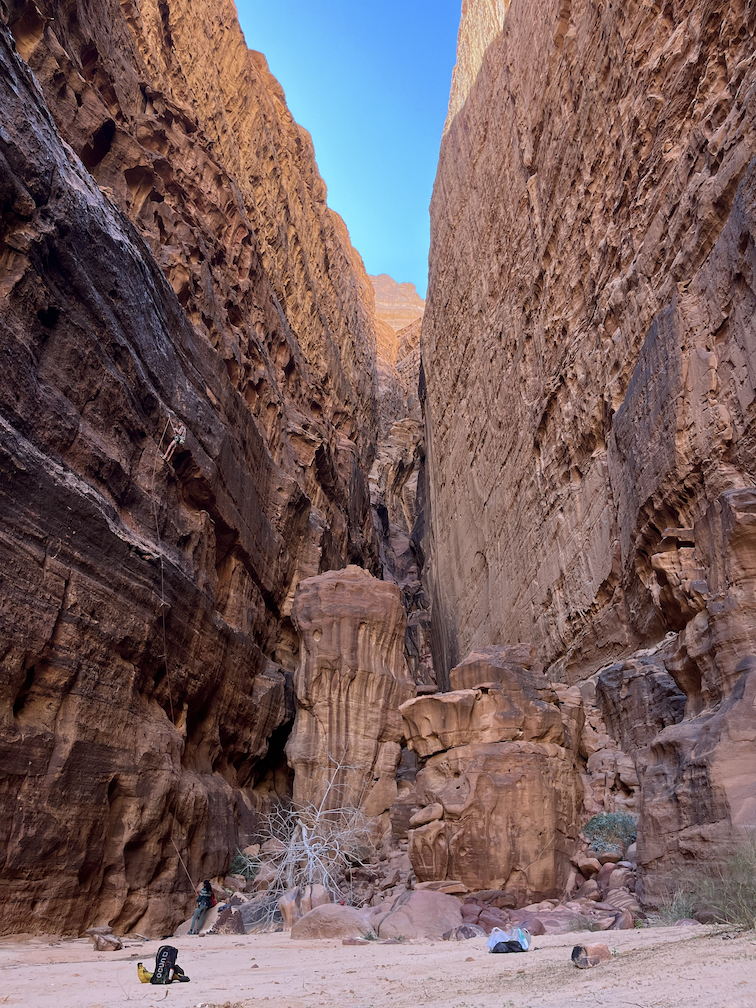From towering red sandstone pillars in the desert-scape of Wadi Rum to a scenic valley overlooking the Dead Sea, more than 600 boulder routes have been established in the past few years. This marks the potential for Jordan to be a world class bouldering capital of the Middle East.
Winter and Spring are the best seasons:
Spring is popular with tourists as the weather is at its best. If you're planning to visit other sites in Jordan, do take note of religious observances such as Ramadan which affects opening hours for a month.
Currently 2 areas have been developed for bouldering. Before going, decide whether to spend time at both or just one as the 350km driving distance between them will take half a day.
You can check out a short video of the trip.
Himara Falls
A few hundred boulder problems are nestled in this beautiful valley overlooking the Dead Sea ending in a beautiful waterfall. This is the most accessible area from Amman with the most developed routes.

The blocs are typically a mix of decent quality sandstone or granite with a good range of grades for climbers of all abilities.

Each year in Spring, the Jordan Climbing Federation organizes a lead climbing competition in March which brings together climbers from all over the Middle East.
The Rock N Roam team usually leads a day trip to Himara Falls after the competition. This is a great way to meet the community and boulder with others from the region.

Wadi Rum
The majestic sandstone formations and Mars-like blood orange sands make this a truly unique landscape to climb in. It was featured on Reel Rock 13, HBO's The Climb, and has been the setting for countless movies.
Because of its size, the sectors in Wadi Rum are quite spread out and navigating the desert to get there does take time.

While the established routes here are mostly trad or sport, there is amazing potential for bouldering as well. In Spring 2022, Chris Sharma bouldered here and sent what is probably the hardest route in the area, Air Jordan (V12).

Similar to Himara, there are boulder problems at all grades though the sandstone quality varies between sectors. Burdah has the best sandstone and is the most developed sector.

Given the huge possibilities in Wadi Rum, there are first ascents to be done everywhere. The only downside is taking extra caution on fragile holds that are susceptible to break.

A good thing about Wadi Rum is the range of climbing styles you can do from trad, multi-pitch, and sport, to boulder. This means your trip can also cater to climbers with different preferences.

One example is at Heaven's arena where new boulder blocs are just starting to be sent.


If you wish to engage a guide, Marwan is a Jordanian climbing instructor with extensive knowledge of the country's climbing and bouldering. He was part of Chris Sharma's crew for their 2022 trip.
There is no published bouldering guidebook yet though one is in progress. If you are set on just bouldering, reach out to Rock N Roam and plan a trip. The team behind this great initiative are Faisal Al-Tajer, Faisal Al Rifai, and Beesan.
Regardless of which area you're at, renting a car is necessary to get to the crags. 'Discover Cars' has decent options for Jordan but do note that driving behavior can be alarming for those used to more organized cities.
Getting to Himara Falls
Amman is the closest city just 67km away and you can drive to the parking spot in a sedan.
Next to Ma'in Street, on the same side as the parking spot, there is a path leading under the bridge that the road is on. After 400m, you will be at the first sector of Himara.

Getting to Wadi Rum
Aqaba in the South of Jordan is 74km from Wadi Rum with an international airport. Unlike Himara, you will need a 4x4 car to explore the boulders in this expansive desert.
Some experience with driving on soft sand is required before doing this on your own. Even though there are well-travelled paths which are more compacted, it is still easy to get your car stuck.
It's also necessary to download an offline map before driving in from main road or Rum Village as there is no connectivity in most of the desert.
Himara
Staying on the edge of Amman on the 7th Circle can help avoid bad traffic. There are plenty of good Airbnb's around Al Swaifyeh where we stayed.
Wadi Rum
There are plenty of desert Bedouin camps in Wadi Rum. We stayed at the Martian Desert Camp which has good food and basic camping facilities. Another popular option is Sun City Camp just off the main road.
Despite the remoteness, it's popularity with tourists means there are a wide range of options and you can also stay in a luxury bubble hotel should you wish.
There are currently no crash pad rentals in Jordan so we advise you to bring your own. Furthermore, some of the landings are tricky and will need multiple pads.
There are no cafes or restaurants near both crags so it is best to bring food with you especially when going to Himara.
Amman
However, Jordan is also famous for having some of the best food in the Middle East, so here are a few popular places to eat at if you stay in Amman while bouldering at Himara.


Wadi Rum
The village has a basic grocery store to stock up on supplies. Most Bedouin camps offer half board with breakfast and dinner so we did not need to bring much food with us.
A popular dinner experience is Zarb, a Bedouin bbq where food is slowly roasted underground over hot coal pits.
As an international tourist, purchasing the Jordan Pass will include the visa fees (typically 40 USD) and entrance to almost all the sites as well as 1 day in Petra.
If you're from one of the country in the Middle East and speak Arabic, you can likely pay the same cheap rates as Jordanian citizens.
Amman
Walking the Roman theater and Citadel are popular day time activities if you like historical sites. Jerash, a hour north of Amman has one of the best preserved Roman ruins outside of Italy.

Wadi Rum
On rest days you can go hiking or for a drive around all the rock formations. There are many which you won't pass by on the way to a crag. Otherwise, you can visit Rum village to restock supplies.

Rest of Jordan
Most tourists in Jordan come for Petra, Wadi Rum, and the Dead Sea. For climbers, getting a short dip and mud mask at the Dead Sea can do wonders for your skin after days of climbing.
If the plan is to climb at both areas, you can fly in to Amman and climb at Himara before driving South to Wadi Rum. Then you can work in rest days at Petra and the Dead Sea.
